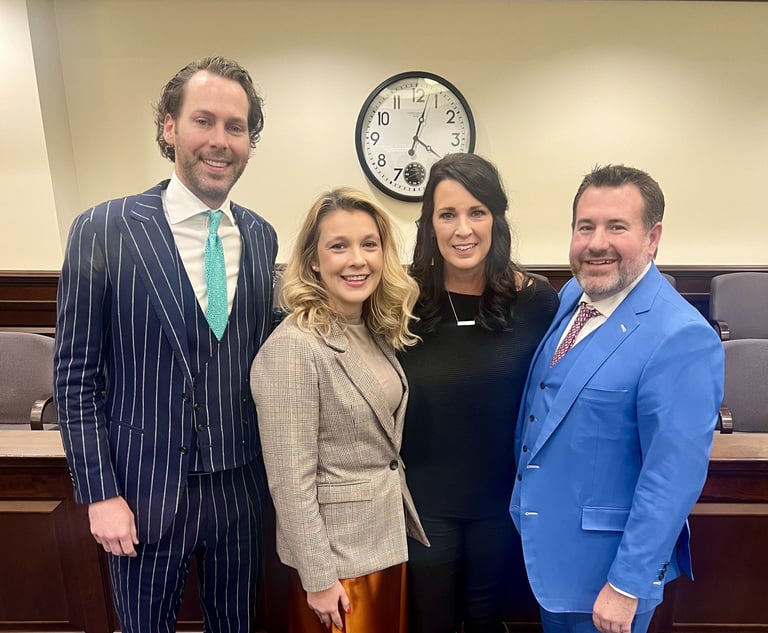Court: Deducting Premiums for Expired Policies Isn't Bad Faith—But It May Be Conversion
A federal district court in Pennsylvania has rejected a bad-faith claim against a life insurer brought by a married couple that alleged that it had continued to deduct premiums from their bank account after the policies had expired—although the court did permit the couple to proceed with their claim for conversion.
September 12, 2018 at 07:32 PM
4 minute read

This story is reprinted with permission from FC&S Legal, the industry's only comprehensive digital resource designed for insurance coverage law professionals. Visit the website to subscribe.
A federal district court in Pennsylvania has rejected a bad-faith claim against a life insurer brought by a married couple that alleged that it had continued to deduct premiums from their bank account after the policies had expired—although the court did permit the couple to proceed with their claim for conversion.
The Case
Edward and Charlotte Yandrisovitz both purchased a $25,000 convertible term life insurance policy from Ohio State Life Insurance Co. in September and October 2001, with guaranteed premiums of $25.66 and $96.30, respectively. Both policies had a 15-year term and expired on Aug. 31, 2016, and Sept. 30, 2016, respectively.
According to the couple, after their policies expired in 2016, Ohio State Life Insurance (then known as Americo Financial Life and Annuity Insurance Co.) renewed them for a year without notifying them or obtaining their consent. The Yandrisovitzes alleged that their insurance policies did not allow Ohio State to renew the policies and to continue deducting premiums from their bank account.
Ohio State increased the policy premiums from $25.66 to $268.79 and from $96.30 to $676.34 and continued deducting these amounts from the Yandrisovitzes' bank account.
The Yandrisovitzes also asserted that, a year later, in September 2017, Ohio State once again renewed the policies after the initial one-year renewal had expired. Again, the couple asserted, Ohio State did not notify them of the extension or obtain their consent to it.
The Yandrisovitzes said that, on Dec. 20, 2017, they contacted Ohio State and requested that it stop deducting funds from their bank account. However, according to the couple, Ohio State deducted premiums on Jan. 9, 2018, and in February 2018.
The Yandrisovitzes asserted that Ohio State deducted a total of $11,753.54 in premiums from their bank account after their policies had expired in 2016 and refused to reimburse them this amount.
The Yandrisovitzes sued Ohio State. Among other claims, they asserted claims for conversion and statutory bad faith under 42 Pa. C.S. Section 8371.
Ohio State moved to dismiss.
The District Court's Decision
The district court granted the insurer's motion to dismiss the statutory bad-faith claim, but refused to dismiss the Yandrisovitzes' conversion claim.
In its decision, the district court found that the Yandrisovitzes had stated a claim for conversion under Pennsylvania law. It reasoned that the Yandrisovitzes alleged that Ohio State had deprived them of funds by removing them from their bank account without their permission; that they did so after the policies had expired; and that the policies did not entitle Ohio State to do so.
By contrast, the district court found that the Yandrisovitzes had not stated a bad-faith claim because they had not alleged that they made a claim for benefits under their policy. To state a claim of bad faith under 42 Pa. C.S. § 8371, the district court said, a plaintiff must allege that the insurer did not have a reasonable basis for denying benefits under the policy and knew or recklessly disregarded its lack of reasonable basis in denying the claim.
The district court observed that “bad faith” has been interpreted to include an insurer's conduct other than an unreasonable denial of benefits, but even in those situations an insured “must have made a claim under the policy to state a claim for bad faith.”
Because the Yandrisovitzes had not made any claim on their policies and did not allege that Ohio State failed to comply with its obligations under the policies, but only that Ohio State took more funds than the policies entitled them to take, the district court granted Ohio State's motion with respect to the Yandrisovitzes' bad-faith claim.
The case is Yandrisovitz v. Ohio State Life Insurance. Attorneys involved include, for the plaintiffs, Neil D. Ettinger of Ettinger & Associates in Whitehall; for the defendants, Andrew Hanan of The Hanan Law Firm in Cherry Hill, New Jersey.
Steven A. Meyerowitz is the director of FC&S Legal, the editor-in-chief of the Insurance Coverage Law Report, and the founder and president of Meyerowitz Communications Inc. As FC&S legal director, Meyerowitz, a member of the team that conceptualized FC&S Legal, provides daily analysis and commentary on the most significant insurance coverage law decisions from courts across the country and news regarding legislative and regulatory developments. A graduate of Harvard Law School, Meyerowitz was an attorney at a prominent Wall Street law firm before founding Meyerowitz Communications Inc., a law firm marketing communications consulting company.
This content has been archived. It is available through our partners, LexisNexis® and Bloomberg Law.
To view this content, please continue to their sites.
Not a Lexis Subscriber?
Subscribe Now
Not a Bloomberg Law Subscriber?
Subscribe Now
NOT FOR REPRINT
© 2025 ALM Global, LLC, All Rights Reserved. Request academic re-use from www.copyright.com. All other uses, submit a request to [email protected]. For more information visit Asset & Logo Licensing.
You Might Like
View All
Philadelphia Eagles 0-2 in Attempts to Recover Insurance on COVID-Related Losses
4 minute read
High Verdicts and Venue Rule Land Pa. Courts on Top of 'Judicial Hellhole' List
5 minute read

Judge Approves $667K Settlement Against Independence Blue Cross for Unpaid, Pre-Shift Computer Work
4 minute readTrending Stories
- 1Hogan Lovells Hires White & Case Corporate and Finance Team in Italy
- 2New York District Attorneys Endorse Governor's Proposed Rollback of Discovery Reforms
- 3Greenberg Traurig Launches Munich Office with Eight Hires, Including McDermott Group
- 4Midlevel Appellate Court Reinstates New York's Voting Rights Act
- 5Consumer Protection Suit Cleared to Go Forward Against Irritating Eye Serum
Who Got The Work
J. Brugh Lower of Gibbons has entered an appearance for industrial equipment supplier Devco Corporation in a pending trademark infringement lawsuit. The suit, accusing the defendant of selling knock-off Graco products, was filed Dec. 18 in New Jersey District Court by Rivkin Radler on behalf of Graco Inc. and Graco Minnesota. The case, assigned to U.S. District Judge Zahid N. Quraishi, is 3:24-cv-11294, Graco Inc. et al v. Devco Corporation.
Who Got The Work
Rebecca Maller-Stein and Kent A. Yalowitz of Arnold & Porter Kaye Scholer have entered their appearances for Hanaco Venture Capital and its executives, Lior Prosor and David Frankel, in a pending securities lawsuit. The action, filed on Dec. 24 in New York Southern District Court by Zell, Aron & Co. on behalf of Goldeneye Advisors, accuses the defendants of negligently and fraudulently managing the plaintiff's $1 million investment. The case, assigned to U.S. District Judge Vernon S. Broderick, is 1:24-cv-09918, Goldeneye Advisors, LLC v. Hanaco Venture Capital, Ltd. et al.
Who Got The Work
Attorneys from A&O Shearman has stepped in as defense counsel for Toronto-Dominion Bank and other defendants in a pending securities class action. The suit, filed Dec. 11 in New York Southern District Court by Bleichmar Fonti & Auld, accuses the defendants of concealing the bank's 'pervasive' deficiencies in regards to its compliance with the Bank Secrecy Act and the quality of its anti-money laundering controls. The case, assigned to U.S. District Judge Arun Subramanian, is 1:24-cv-09445, Gonzalez v. The Toronto-Dominion Bank et al.
Who Got The Work
Crown Castle International, a Pennsylvania company providing shared communications infrastructure, has turned to Luke D. Wolf of Gordon Rees Scully Mansukhani to fend off a pending breach-of-contract lawsuit. The court action, filed Nov. 25 in Michigan Eastern District Court by Hooper Hathaway PC on behalf of The Town Residences LLC, accuses Crown Castle of failing to transfer approximately $30,000 in utility payments from T-Mobile in breach of a roof-top lease and assignment agreement. The case, assigned to U.S. District Judge Susan K. Declercq, is 2:24-cv-13131, The Town Residences LLC v. T-Mobile US, Inc. et al.
Who Got The Work
Wilfred P. Coronato and Daniel M. Schwartz of McCarter & English have stepped in as defense counsel to Electrolux Home Products Inc. in a pending product liability lawsuit. The court action, filed Nov. 26 in New York Eastern District Court by Poulos Lopiccolo PC and Nagel Rice LLP on behalf of David Stern, alleges that the defendant's refrigerators’ drawers and shelving repeatedly break and fall apart within months after purchase. The case, assigned to U.S. District Judge Joan M. Azrack, is 2:24-cv-08204, Stern v. Electrolux Home Products, Inc.
Featured Firms
Law Offices of Gary Martin Hays & Associates, P.C.
(470) 294-1674
Law Offices of Mark E. Salomone
(857) 444-6468
Smith & Hassler
(713) 739-1250





